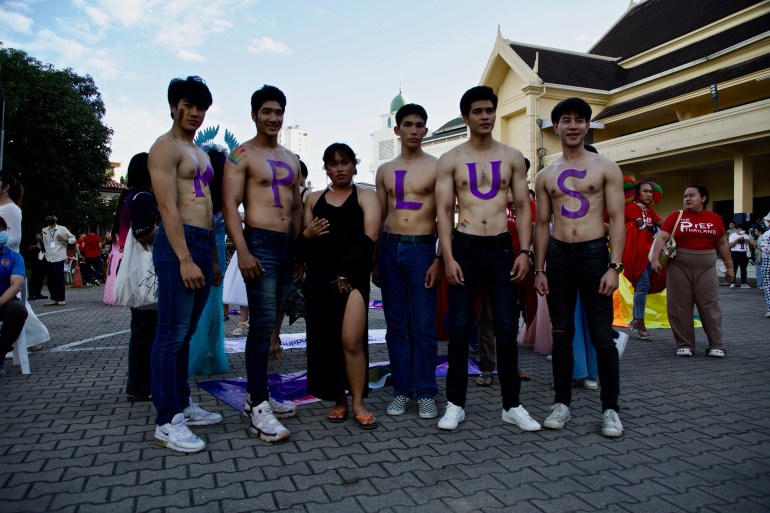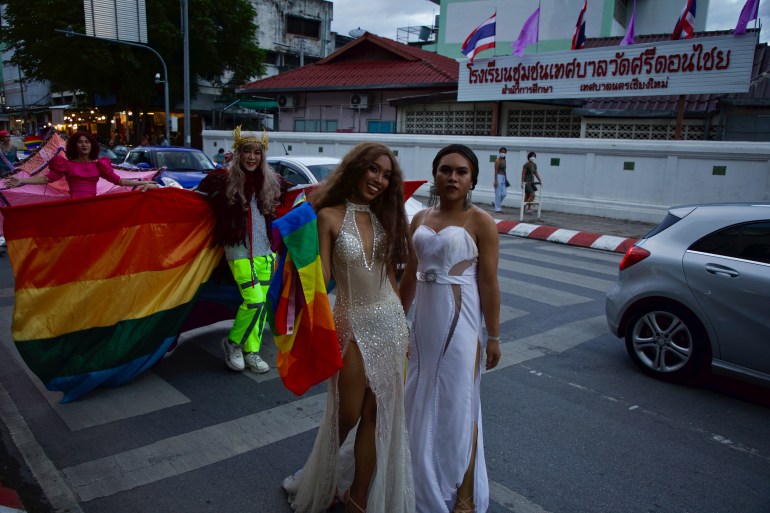‘Hope has a place’: Thailand moves forward on civil unions
Chiang Mai, Thailand – On July 3, hundreds of people marched through the streets of Chiang Mai, Thailand’s second biggest city, for its fourth-ever Pride parade before converging on the ancient Tha Phae Gate where they danced and celebrated under a light drizzle.
“We are gathering together because we have to speak our voice for pride and make everyone equal in Thailand,” said university student Nutcha Nimasang. “I want to see something change in my generation.”
Thailand is poised to become the first Southeast Asian nation to grant some form of legal recognition to same sex partnerships, although it is not yet clear whether this will be in the form of civil unions or full marriage equality. Both proposals passed parliament on the first reading, but they will need approval from various other levels of government before becoming law.
Like many others at the parade, Nutcha is a supporter of the Move Forward Party (MFP) – the pro-democracy political party that put in a strong performance in the 2019 election and introduced the marriage equality bill. She said the push for gay marriage was “the same” as pushing for greater democracy because “it is our human right”.
Thailand has a tumultuous relationship with Pride events. After an inaugural event in 2008, a parade the following year was blocked by angry protesters, before returning in 2019. The 2021 parade was cancelled because of COVID-19.
“Marriage should have no gender, everyone should be able to marry,” Nutcha said.
MFP leader Pita Limjaroenrat said he originally expected that the civil union reform would pass parliament at the expense of the marriage equality bill.
“But we managed to fight to keep both tracks open,” he told Al Jazeera in a telephone interview in June.

Pita said if only the civil union bill receives final approval, MFP will continue the fight for full marriage equality. “Our message to the public is that the two bills don’t contradict each other. Both can be passed… Both can be progress,” he said.
He explained that some homosexual and heterosexual couples may want civil unions, while others may want marriage, and the two options should be available to everybody. If the civil union bill alone is passed, he said this will be progress for the people who “have been fighting for 30 or 40 years” but he would “still want to see more”.
Pita said the push for gay rights is “inherently connected” with the broader pro-democracy movement and praised Thailand’s general acceptance of these issues.
“The nature of Thailand, we are not discriminatory based on gender, sex or race, compared to many other parts of the world,” he said, adding that MFP has taken “inspiration” from Taiwan’s gay marriage reforms. The territory is the only place in Asia to have legalised same sex marriage.
Democratic reform links
Thailand has been ruled by a military-backed government since a coup in 2014 that removed the democratically-elected government led by the Pheu Thai Party. Elections in 2019 were heavily skewed in favour of the military, which directly appointed all 250 members of the Senate, which selects the prime minister in conjunction with the elected House of Representatives.
The Pheu Thai Party once again won the most seats in the lower house, but the military-backed Palang Pracharat Party was able to form the government thanks to its unelected advantage. The MFP emerged out of the progressive Future Forward Party, which surprised many by coming in third in its first-ever election but was then forcibly dissolved before emerging rebranded as Move Forward.
The dissolution of MFP sparked mass protests in 2020, with the movement broadening to demand greater democracy and reforms to Thailand’s powerful monarchy.

The overlap between Thailand’s pro-democracy movement and the push for gay rights was on full display during Chiang Mai Pride. Many participants were supporters of MFP, with some wearing shirts featuring the party’s logo in rainbow colours.
One marcher was also carrying signs calling for the abolition of lese majeste, a controversial law criminalising criticism of the king. Future Forward Party founder and former leader Thanathorn Juangroongruangkit is facing multiple lese majeste charges, as are many of the 2020-21 protest leaders.
The gay rights reforms come on the heels of Thailand decriminalising cannabis for certain purposes, which MFP’s Pita sees as another victory. He is already eying his next cause: the expansion of Indigenous rights.
Pita said the recent progress on social issues, even as fundamental political reforms stall, reflects Thailand’s mai pen rai attitude – a common phrase that roughly translates to “never mind” or “no problem”.
He said this attitude means Thais are less discriminatory and tolerant of other lifestyles, but also less willing to push against the “political inertia” that benefits the military, the monarchy and other political elites.
Speaking at the Pride event, Ray Laohacharoensombat, who spent some time living in San Francisco, told Al Jazeera he has already seen “really fast progress” since returning to Thailand. “I can see the social movement in Thailand right now is really a step forward,” said Laohacharoensombat, a member of Mplus, one of the event’s organisers.
Mplus is an all-men’s LGBTQ+ organisation with a focus on HIV testing. Laohacharoensombat said he was marching “for the new generation, for the youth, for empowerment and for human rights.”
Phattarapong Leelaphat, another participant and MFP supporter, was insistent that only full marriage equality would be acceptable. “It’s not enough… The law needs to be equal for all,” he said.
‘Archaic people’
According to human rights organisation Manushya Foundation, the civil union bill grants some rights, like adoption, property management and inheritance but does not cover tax benefits, government pensions and spousal medical decisions. This amounts to “second-class citizenship treatment”.
“If your life partner is in a coma you can’t sign as a representative for that person… You have no power even if you’ve been together more than half your life,” Phattarapong pointed out.
While many at Pride were in a celebratory mood, the process may still take a while.
A second reading of the bill in parliament is expected by the end of September, followed by a third reading and then three readings in the Senate.
Many fear the upper house may prove a final barrier to full marriage equality.
“These old moral archaic people want the civil partnership bill, not marriage equality,” said Emilie Palamy Pradichit, a feminist human rights lawyer and founder of the Manushya Foundation. Despite this, Pradichit said the movement for full equality is “so strong, and so powerful”.

A representative from the legal group Internet Dialogue on Law Reform (iLaw) said the Senate does not have the power to kill a bill, but it can stall the proposed legislation indefinitely. A majority of MPs from the ruling coalition voted to reject full marriage equality on the first reading.
“Should a majority of MPs from the ruling coalition reject the bill in the third reading, the draft that proposes to amend the Thai marriage law would not see the light of the day in the Senate’s floor or become law,” they said.
That has not dampened the hopes of activists like Laohacharoensombat who is still holding out for full marriage equality.
“Hope has a place,” he said.

